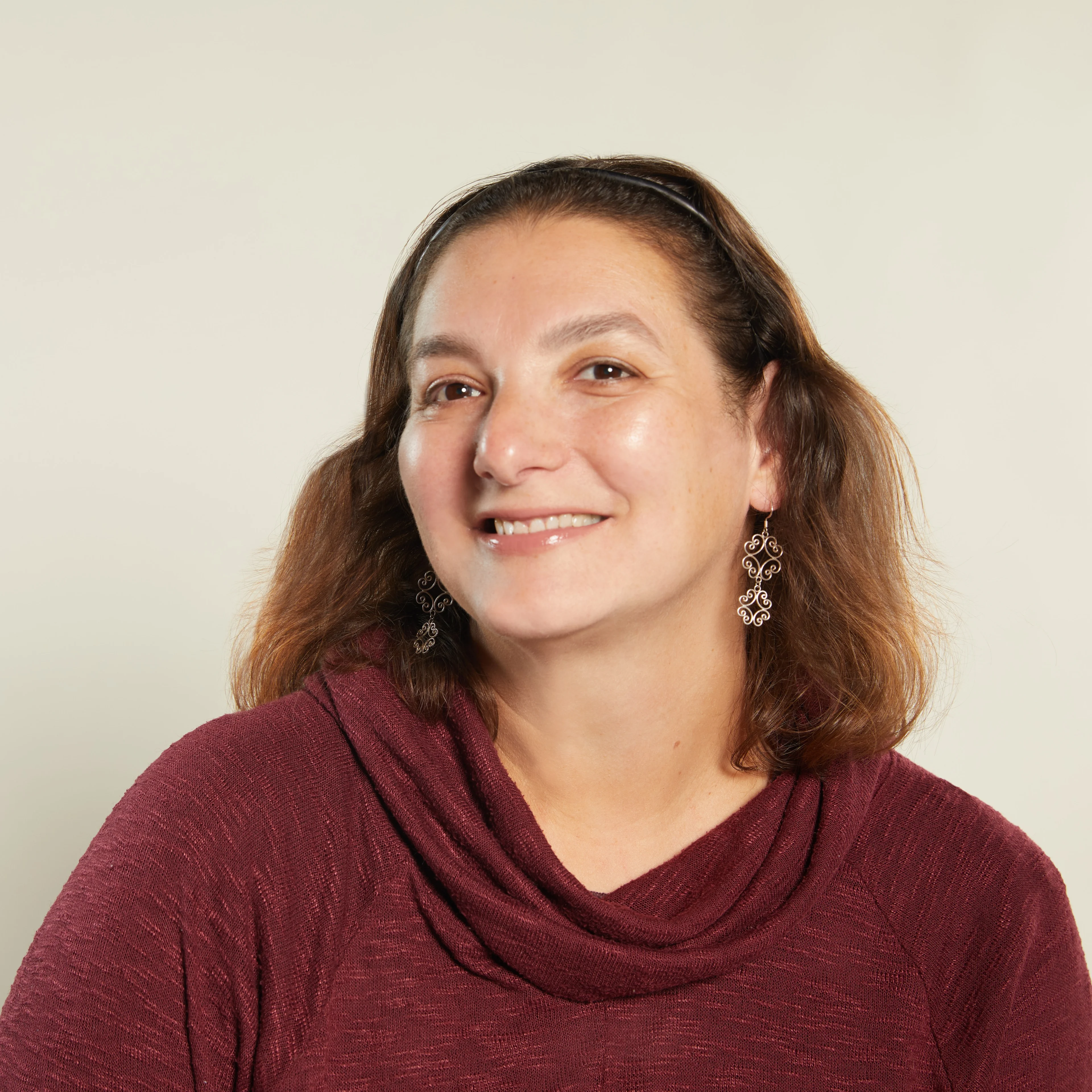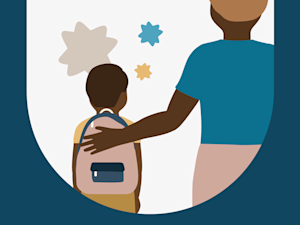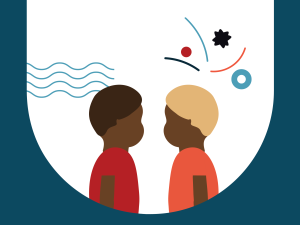Stay in the know
All our latest podcasts delivered right to your inbox.
For many families, the new school year brings a real mixed bag of emotions. There’s the excitement of a fresh start combined with jitters about all of the unknowns. For families of kids who learn and think differently, there may be IEPs or 504 plans, and new teachers to connect with about all these things. It’s a lot to think about — and to navigate.
In this episode, hosts Gretchen Vierstra and Rachel Bozek talk with returning guest DeJunne’ Clark Jackson, an education consultant and parent advocate. She’s also the mom of two kids, one with an IEP. Tune in for back-to-school strategies that have worked well for DeJunne’ and her family. Find out how she sets goals with both of her kids, keeping in mind their strengths and challenges.
Related resources
Download: Back-to-school update for families to give to teachers
Download: Goals calendar for kids who struggle with planning
My kids have different strengths and challenges. Here’s how I set goals with them.
Hear more from DeJunne’ in this episode about parent-teacher conferences from last season
Get back-to-school tips from executive function coach Brendan Mahan in this episode about building executive function skills
Episode transcript
Gretchen: From the Understood Podcast Network, this is "In It," a podcast about the ins and outs...
Rachel: ...the ups and downs...
Gretchen: ...of supporting kids who learn and think differently. I'm Gretchen Vierstra, a former classroom teacher and an editor here at Understood.
Rachel: And I'm Rachel Bozek, a writer and editor with a family that's definitely in it.
Gretchen and I have been away from our microphones for most of the summer, apart from a bonus episode here and there. But with the new school year very much upon us, I think we're ready to jump back in.
Gretchen: Actually, here in California, school has already been going on for a few weeks. But that doesn't mean we couldn't use some tips on how to help our kids get off to a good start.
Rachel: Not to mention what to do if things get bumpy fast.
Gretchen: So to help us with that, we've invited back DeJunne' Clarke Jackson.
Rachel: DeJunne' is a former teacher and school counselor based in Baton Rouge. Now, she works as an educational therapist and student advocate.
Gretchen: She's also president of the Center for Literacy and Learning, a nonprofit that supports teachers who teach reading.
Rachel: And she's a parent of two kids, one with learning differences and one without.
Gretchen: Last time she joined us, we talked about how to prepare for parent-teacher conferences. And we will never forget her describing herself as "the five-inch binder mom."
Rachel: We're so glad to have her back with us today. DeJunne', welcome back to "In It."
DeJunne': Thank you for having me. So glad to be back.
Gretchen: We are so happy to have you back. And last time we had you on the podcast, you talked about your two kids. And I know one of them learns and thinks differently and has an IEP. And I'm wondering if you're talking to your kids before school starts, and what kinds of conversations you're having with them.
DeJunne': So, yes, I am having conversations with both my boys, age 9 and 14. So we're going into the fourth and the 10th grade. My oldest, of course, is the one with learning differences. So their conversations are the same, but different.
And so we actually started having those conversations at the end of last school year. So we don't reserve those conversations for just the start of this upcoming school year. Mostly because my boys really try to avoid knowing that school is starting. So we — I really want to capture their attention when they're in this mindset of like being open to having those conversations about what the next school year looks like. What did this last school year look like?
And my conversations with my 9-year-old look a lot different than my 14-year-old because his conversations are, you know, a lot around like social norms and expectations and, you know, our friendships in the social media realm and navigating teenager hood.
Gretchen: Yeah, I'm so glad to hear you brought up social things. I'm wondering, especially with your older child, do you kind of reflect on last year in terms of academics and then set academic goals for the following year? Talk a little bit about that.
DeJunne': Yeah. So we set academic goals for both kids. One thing about goal setting, though, our expectation is that both kids do their best. And it varies per subject. So we lean into the strengths.
And if I know that science is your jam and you're good at it, then we set the expectation to match your ability. And if it's an A and we know you can perform at an A, then we set that expectation at an A. And if math is your challenge and we know you struggle through it and you show up every day to try your best and be your best, and if your best in math is a C on your best day, then a C is what we, you know, high-five you for.
Rachel: I really like that — leaning into strengths and challenges. Because sometimes it can be easy for us to say, well, you got an A in science, so that means you can definitely get an A in math too, right? And then that can feel really defeating for your kid, because maybe they can't get an A in math too.
DeJunne': And this is coming from an educator. So when I tell my friends this, they're like, Oh my God, I can't believe like, you don't want, you know, you don't want to to breed this like Harvard, you know?
Even with my youngest, who, you know, who performs really well academically, and at the end of the day, I just want to create human beings that are, you know, wonderful law-abiding citizens, that are helpful, that have good hearts, and who are proud of themselves because they showed up every day and did their best.
And so sometimes you just need to lean into those strengths. And then really appreciating and celebrating the strengths that are nonacademic, right? So having and appreciating the fact that your student may not excel. They may be a straight C student. But they're an extremely talented artist. Or they can play an instrument really well. Or they excel in sports.
And that's the thing that keeps them going. That's the thing that helps them show up to math class every day that they hate. But they're doing it because the goal that you set is, you know, for them in order to get to that area of strength and to continue in that, you sort of tied in, you know, well, you know, we're going to make sure that we maintain our C average in all these subjects in order to support your love of art or go to this art showcase this year, you know. And so you just want to make sure it all marries together.
Gretchen: Well, I'm going to switch gears a minute and get to a kind of more nuts-and-bolts question. A lot of times for many kids, the new school year also comes with like new organization methods. Maybe it's like a new folder. Or maybe they've gone to like the Dollar Store and gotten some caddies to organize things in. And it's going to be great. I'm going to be so organized with my pens here and this here.
And then perhaps after a month or two, all this flash of new caddies and whatnot starts to fall apart. Do you have any strategies for this — of how to set like organization kind of goals that will actually work and won't break the bank too?
DeJunne': Yeah, this — honestly, a very transparent moment as a parent. This has been one that we've struggled with. We had a laundry list of things that didn't work. We've tried binders and dividers and labeled folders and journals and agendas. And I think that's sort of where you begin. You try. And if it doesn't work, you try a different way. And you just keep trying something until it works.
And we've, for a number of years, lived for a checklist. I mean, checklists got us through everything — from waking up in the morning, to tying our shoes, brushing our teeth, you know, taking our medicine, getting out the door. If we did not have a checklist, it did not get done.
And that's one thing that we realized: Our kiddo was a minimalist. So the more things we gave him, the more frazzled he would be and trying to remember how to use those systems. Right? So that's why we we sort of came to the conclusion of, Oh, this is why a checklist was so easy, because it was simple.
And so now we function with one notebook. We don't even have the fancy notebook with the divided sections. Because we tried that — like math, science, social studies. Everybody's getting written in one section. We do one folder and pray to God that all the papers get into the folder. Sometimes they are crumpled up at the bottom of the book bag most times.
Rachel: But they're there.
DeJunne': Yeah, but they're there. And then his computer and his phone are the most valuable assets for us, because his phone, the notes app — and of course I'm talking about the oldest kid with the learning challenges — the phone, his notes app. It's a running record of God knows what, but it gets there. And then his computer because his teachers in the communication, everything is on that computer. That's what we've sort of teetered along those lines.
But yeah, we've struggled through a number of years because we wanted it to be all nice and pretty with the caddy and the different colored pens and the highlighters and stickers and, you know, and that works for some. And I say, go for it. And Dollar Tree will be your best friend, you know? But for some, less is more.
Rachel: So for families with kids who learn and think differently, and maybe they have IEPs or 504s and maybe they don't. But they still want to kind of level-set at the beginning of the school year. Who should they touch base with? Teachers or school counselors? Specialists? And like, when is the right time to do that? Should they wait for their parent-teacher conference? Or, you know, how much time should they give for a conversation to happen that's just kind of like, hey, just want to touch base.
DeJunne': Yeah. So I want to preface my answer by saying, yeah, there are categories of parents who have sort of been in this space of students with learning differences. I would probably be categorized as the crusader parent, right? I've been in this fight for a long time. I am probably the one that's on the horse with the shield, you know, with the sword in the air leading the calvary behind me.
And so have to say that, right, because it depends on where you are in this journey. So I say that because my answer is everyone. Who you should touch base with is everyone at the start of the school year. Elementary looks much different than high school. Those "everyones" look a little different on each campus.
But I also say that with — I use the sort of target or dartboard model when I work with the "everyone," you know, sort of model. I look at those who are closest or have the most touchpoints to my kiddo. So I may start with his classroom teacher. And of course, elementary, you'll know, it's probably just, you know, one teacher and maybe the school counselor. That's your core.
But if your kiddo has an IEP, then of course the core is the IEP teacher of record. Then maybe your next ring could be the assistant principal or the dean or whomever. He may have a next touchpoint with your kiddo. Maybe your kiddo has some behavior challenges, so you may want to reach out to the dean of students or the vice principal who handles your behavior, you know, concerns. And then the next one might be the principal.
But are sort of these layers, right, that you're building out from? But at the end of the day, I need everyone to know, hey, here's my kid. He has an IEP. I want to make sure you're aware and that you have a copy, and that he has those things in place on day one. And that I am his parent and that I am here to support you and to support him. And reinforce what is happening in the learning environment. And I want to do this outreach campaign at the beginning of the school year.
To your point, I don't wait to parent-teacher conference. Because those usually aren't scheduled until like September, October, and by then it's too late. I don't want to talk about how he's underperforming at that time. I want to get it out and get it ahead of time.
Gretchen: Right. Because your kids are starting in August. So October would feel like a long ways in.
DeJunne': Forever away. So we want to get it ahead of time. Some send letters. I'm sure we've seen all the the letters that float around on social media that introduces their kid. I think those are so cute. I like the in-person, you know, feel so that we can put a face to name. I don't want to give too much information. I want them to get to know my kid for themselves, and just give them sort of that surface level of information. But just really as an introductory.
Gretchen: Well, I know we're close to our end DeJunne'. But I do have a question that I think a lot of families might be wondering about, which is, you know, school starts fresh, start, you know, reset. Maybe a month in, oh my goodness. Things have not gone as we thought.
Like maybe there's some, you know, bad interactions with other kids or teachers, you know, like my teacher, I don't like them. Or, you know, there's been a couple of failed tests or whatnot. Who knows what it is. But this you know, it's not the the glory you had hoped for. So how do you not despair? How do you not despair as a parent? And how do you help your kid not despair when that happens?
DeJunne': It's difficult. You just you want — your immediate instinct as a parent is probably to fix it, right? You just want to fix it. You want to make it all better. I'd probably say that if things are looking doom-and-gloom in the beginning, that there's probably, you know, some transitioning pains, some growing pains.
Because remember, this is new, especially your younger kiddos, new teachers. You're not doing it like Miss So-and-so did it. This is not how I'm used to it being done. It's new for them. That doesn't mean that it's necessarily bad. It's just different, you know? And so helping them understand the difference will really help as you talk to them through those things.
I could probably say that there's probably a lack of communication or miscommunication or misunderstandings somewhere. I don't recommend just, you know, jumping in to trying to fix it. You know, have conversations for the goal of understanding and be proactive versus reactive. Really get into there and, you know, work with your child's teacher. Or work with whatever information that you need to know to be able to gain an understanding and awareness of what's going on. Instead of, you know, having them just adapt. Like, oh, get over it, you know, you'll get used to it.
Encourage them to self-advocate. You know, it's so important and it's so underrated to have kids have a voice. And I think it comes from that, you know, that old-school parenting, that mindset that kids are, you know, to be seen and not heard. And I think we've done such a great job of trying to change that and have our kids be heard as we talk to our kids more and give them a voice. And have them know that it's OK to speak up.
You know, teaching them, like, how do I politely interrupt. You know, even like sort of the process by which we speak up and that we use our voice. And so encouraging them to self-advocate. So if something doesn't sit right or feel right, or they believe that they are misheard or misunderstood, then how do I tell my teacher that? So even just giving them permission to have dialog with their teachers that they want just a better understanding? I think that that's a great place to start.
Rachel: Yeah, and the teachers appreciate that. The teachers appreciate that.
DeJunne': Yeah. Yeah. And they should. And if they don't, then that's a different conversation we can have.
Rachel: Yeah, well, that is all so helpful. I have one more question. Any other advice you have for parents and caregivers or maybe even for teachers and support staff as we get settled into the new school year?
DeJunne': Give grace. Our kids are trying. And if they're not trying, find out why. And I think when we get to that, we'll discover those strengths and pull out the things that they need help discovering. And I think we'll get our kids, you know, those goals that we set for them, they'll accomplish. I'm excited for our kiddos.
Gretchen: I'm excited, too. Especially after talking to you today. I feel like it was a pep talk for us. Thank you so much for being with us, DeJunne'.
Rachel: Thank you.
DeJunne': Thank you for having me again.
Gretchen: You've been listening to "In It" from the Understood Podcast Network.
Rachel: This show is for you, so we want to make sure you're getting what you need. Email us at InIt@understood.org to share your thoughts. We love hearing from you.
Gretchen: If you want to learn more about the topics we covered today, check out the show notes for this episode. We include more resources as well as links to anything we mentioned in the episode.
Rachel: Understood.org is a resource dedicated to helping people who learn and think differently discover their potential and thrive. Learn more at understood.org/mission.
Gretchen: "In It" is produced by Julie Subrin. Briana Berry is our production director. Justin D. Wright mixes the show. Mike Errico wrote our theme music.
Rachel: For the Understood Podcast Network, Laura Key is our editorial director. Scott Cocchiere is our creative director. And Seth Melnick is our executive producer. Thanks for listening.
Gretchen: And thanks for always being in it with us.
Hosts

Gretchen Vierstra, MA
is the managing editor at Understood and co-host of the “In It” podcast. She’s a former educator with experience teaching and designing programs in schools, organizations, and online learning spaces.

Rachel Bozek
is co-host of the “In It” podcast and the parent of two kids with ADHD. She has a background in writing and editing content for kids and parents.
Latest episodes
April 25, 2024
Learn about common reasons families might look for a special education attorney and what their other options are.

April 11, 2024
Learn ways to advocate for your child at school while maintaining a good relationship with their teachers.

March 28, 2024
The track and field gold medalist shares her story and talks about ADHD, dyslexia, and building confidence.

March 14, 2024
The hosts interview kids’ book author Lindsey Rowe Parker. She talks about her new picture book about sensory differences in kids.

February 29, 2024
Understanding what a language disorder means for your child can be overwhelming. Here’s help from an expert.

February 15, 2024
Talking with your child about their diagnosis of a learning and thinking difference can be tough. Get advice from an expert.

February 1, 2024
How can you manage the challenges of having one child who learns and thinks differently and one child who doesn’t? Get advice from an expert.

January 18, 2024
Any sibling relationship can be hard to manage. But what happens when one of the siblings has a learning or thinking difference? Here’s one mom’s story.

January 4, 2024
Overwhelmed by talking with your child’s pediatrician about ADHD or learning differences? These tips can help.

December 14, 2023
Tantrums and meltdowns are challenges all parents face. Get tips for projecting calm when kids and teens have tantrums.
